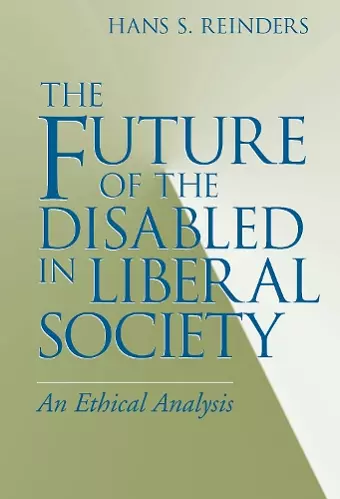The Future of the Disabled in Liberal Society
An Ethical Analysis
Format:Paperback
Publisher:University of Notre Dame Press
Currently unavailable, and unfortunately no date known when it will be back
This paperback is available in another edition too:
- Hardback£83.00(9780268028565)

The Future of the Disabled in Liberal Society questions developments in human genetic research from the perspective of persons with mental disabilities and their families. Hans S. Reinders argues that when we use terms such as “disease” and “defect” to describe conditions that genetic engineering might well eliminate, we may also be assuming that disabled lives are deplorable and horrific. Reinders points out that the possibility of preventing disabled lives is at odds with our commitment to the full inclusion of disabled citizens in society. The tension between these different perspectives is of concern to all of us as genetic testing procedures proliferate. Reinders warns that preventative uses of human genetics might even become a threat to the social security and welfare benefits that help support disabled persons and their families. Reinders also argues that this conflict cannot be resolved or controlled on the level of public morality. Because a liberal society makes a commitment to individual freedom and choice, its members can consider the diagnostic and therapeutic uses of human genetics as options available to individual citizens. A liberal society will defend reproductive freedom as a matter of principle. Citizens may select their offspring in accord with their own personal values. Reinders concludes that the future of the mentally disabled in liberal society will depend on the strength of our moral convictions about the value of human life, rather than on the protective force of liberal morality. One of the most important aspects of this book is Reinder’s attention to parents who have come to see the task of raising a disabled child as an enriching experience. These are people who change their conceptions of success and control and, therefore, their conceptions of themselves. They come to value their disabled children for what they have to give. Even though disabled children and disabled adults present parents and society with real challenges, the rewards are just as real. This powerful critique of contemporary bioethics is sure to become required reading for those interested in human development, special education, ethics, philosophy, and theology.
"In The Future of the Disabled in Liberal Society, [Reinders] subtly explores how genetic-testing technologies—ones that are already widely used and others that are just around the corner—adversely affect the standing of the disabled in liberal states. A professor of ethics, Reinders has written an intellectually challenging work of philosophy and social policy. . . . [He] has done a great service by demonstrating how even a seemingly benign aspect of the high-tech revolution, genetic testing, will have unintended consequences none of us can greet with equanimity.” —Policy Review
“[T]he book as a whole will offer to advanced undergraduates an engaging and challenging introduction to some of the most influential ethical thinkers of our time. Very highly recommended....” —Choice
“[A] sophisticated and welcome contribution to what the author calls the continuing debate concerning the strengths and weaknesses of liberal morality that dominates contemporary society. This is a sobering book.” —Commonweal
“[A] well-reasoned examination...." —Theological Studies
“By demonstration the inherent paradoxes in liberal approaches to the disabled, [Reinders] effectively reveals potential policy limitations that may threaten the social services available to the mentally disabled.” —Religious Studies Review
“...this book provides a rich resource for understanding thinking in contemporary secular bioethics.... Reinders's work greatly helps one to understand the reasoning and application of liberal secular philosophy and details its shortcomings.” —The National Catholic Bioethics Quarterly
“... an intellectually challenging work of philosophy and social policy. Reinders . . . has done a great service by demonstrating how even a seemingly benign aspect of the high-tech revolution, genectic testing, will have unintended consequences none of us can greet with equanimity.” —Policy Review
ISBN: 9780268028572
Dimensions: 229mm x 152mm x 17mm
Weight: 436g
294 pages